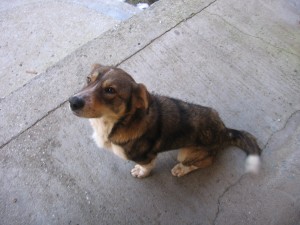 I have just returned from spending two winter months in the north of Albania. On January 31st, a particularly heavy snowstorm tore down all the electrical wires and closed the only road – a 25 kilometer dirt road – to the nearest town. This effectively sealed off the whole valley from any form of modern convenience. With a shrug, the whole valley turned back to living as I suppose they must’ve for hundreds of years. And I went with them.
I have just returned from spending two winter months in the north of Albania. On January 31st, a particularly heavy snowstorm tore down all the electrical wires and closed the only road – a 25 kilometer dirt road – to the nearest town. This effectively sealed off the whole valley from any form of modern convenience. With a shrug, the whole valley turned back to living as I suppose they must’ve for hundreds of years. And I went with them.
Families gathered around candles in the one room with a wood stove. Men played chess or dominoes. Women sat by the stove and knitted. Time became precious. And time became endless. I caught it myself. It’s 4:30. If I go out now, to feed the horse, I will catch the last half hour of daylight. Of course, you put it off as long as you can, to trim a half hour or so off the long hours of night that the horse will spend alone, in the dark and cold – but leave it too long, and it’s feeling your way in the dark along the body of the horse, to untie the rope around his leg and lead him out into the dark and snow which he will sink into, up to his chest if you lead him the wrong way, which will panic him, for his last drink of water before the night. Also, of course, if you’re too silly to have changed out of wet clothes from the last time you fed him, you will be shaking with cold by this time, with a cold that prevents you from feeling anything, except the bone-shattering necessity of putting one foot in front of another to look after the animals, cows, sheep and goats that at this point, with the road closed, you’re living off of.
All of this, of course, for me, the visiting American, is a bit of an adventure. At some point however I realize that it’s been long enough – 30 days, 40 days, 60 days (I keep extending my stay) – so that at some point, it isn’t a jaunt anymore, it’s a way of life that I’ve shared. It is normal now for me to realize that there’s no point in going to bed alone. One body is not enough to build up enough heat for the blankets to hold. So I stay on in the kitchen where the wood stove is, stubbornly re-reading Treasure Island. In the morning, the blankets will be wet with condensation from the heat made simply by sleeping, opposed to the utter freeze of the room. I will bring the blankets down occassionally, to hang them in front of the stove, and everyone will exclaim “how wet they are!” but with laughter, not actual shock, that anyone will live this way.
In this world, daylight is precious. In the daylight, we sometimes walk abroad, though this isn’t possible, when the snow is normal deep. Normal deep is a meter or two, too deep to walk through, too exhausting for more than a few paces. One day I made myself snowshoes, slogging through the waist-deep snow to the nearest stand of pine trees, accompanied by the dog who two weeks later will be eaten by wolves, not far from where I cut the branches for my snowshoes. I tied the circles of soft pine branches to my feet with lengths cut from a ball of twine, which the dog would later steal, and run off with across a frozen meadow. For one afternoon our crazy footprints, mine heffalump fat, his light and airy, chased each other across the blinding white. Two weeks later a nasty red hairpin trail would be the only sign left of the dog. Other than the blood, there was no trace. No fur or inedible parts, a simple erasing in the clean white snow. My friend tells me that the wolves play dumb, wounded, to trick the dog into approaching. A quick bite to the neck, and then the wolf flips the body onto its back, and strides cleanly away.
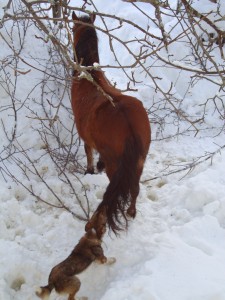 I cry over the blood in the snow, and then go to feed the horse. It’s 4:30. It will be dark, soon. The end of another day, and another day after it to get through. Are you wet? They ask me all the time, and at first I used to answer, soaked to the bone, “Not so much,” laughing, until I caught the utter freezing chill that comes with any damp. When I had to go to the horse shaking, because my very bones were cold, no matter how my flesh felt, I learned to respect their question. Are you wet?
I cry over the blood in the snow, and then go to feed the horse. It’s 4:30. It will be dark, soon. The end of another day, and another day after it to get through. Are you wet? They ask me all the time, and at first I used to answer, soaked to the bone, “Not so much,” laughing, until I caught the utter freezing chill that comes with any damp. When I had to go to the horse shaking, because my very bones were cold, no matter how my flesh felt, I learned to respect their question. Are you wet?
I’m wet, I’m damp, help me. So this becomes part of the rhythm of every day – fighting off the cold and wet, when all you are surrounded by is cold and wet, and the house is circled by the enormous footprints of the wolves.
I’ve never seen a wolf. Alfred, who’s lived here for 30 or more years, has never seen a wolf. But they’ve eaten every dog he’s ever tried to have.
Sose, Alfred’s mother, knits endless socks. She knits so many socks, I wonder how anyone could ever wear them all. Some are pretty and decorative. I see some of the little pairs turn up in Arsalinda and Ela’s hands. They are small children who live across the field, the children of Alfred’s cousin Shkelzen. Whenever I go visiting anywhere, someone seems to give me a pair of socks. I have now a pair of black and pink socks, a pair of green socks with purple stripes, a gold pair, a purple pair and a precious pair of pure, handspun wool, or lesh.
If I am stupid, and I get wet, I can sit by the wood stove, and watch the steam rise off my legs. But this external drying will not stop the shaking that will possess my body within the hour. It’s strange how important dry feet become. It’s good that so many women have given me the socks they made, so that I have enough to change to dry ones often.
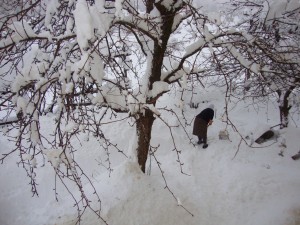 Now that I’m back in New York, people ask me: Is winter hard there? And like a good Malesore, I want to shrug and say, Not Really. It’s not, really. You just learn it, and get on with it. Here’s a strange thing. I can’t really eat anything, now that I’m back. There, we ate full fat everything that came from a cow. Lunches of cheese boiled in cream, boiled in butter. Slurp it up with a big chunk of bread, baked fresh that day. Eat a gigantic bowl of it for lunch, another for dinner, perhaps some meat soup added that turns rock solid into fat when the heat fades away, but is delicious when hot. Breakfast more of the same. I ate a tub of fat food, three times, maybe four a day. And grew limber and slim. And shook with cold and damp. Or felt blissful and warm, when I did. A triumph was when I learned and remembered the exact dance of feet that let me get out of my mudboots, good for visiting the horse (that time, again?) and into my house slippers, without wetting my socks in the snow. More warm, for me. The dog would stand by the backdoor, wagging, without hope of getting in.
Now that I’m back in New York, people ask me: Is winter hard there? And like a good Malesore, I want to shrug and say, Not Really. It’s not, really. You just learn it, and get on with it. Here’s a strange thing. I can’t really eat anything, now that I’m back. There, we ate full fat everything that came from a cow. Lunches of cheese boiled in cream, boiled in butter. Slurp it up with a big chunk of bread, baked fresh that day. Eat a gigantic bowl of it for lunch, another for dinner, perhaps some meat soup added that turns rock solid into fat when the heat fades away, but is delicious when hot. Breakfast more of the same. I ate a tub of fat food, three times, maybe four a day. And grew limber and slim. And shook with cold and damp. Or felt blissful and warm, when I did. A triumph was when I learned and remembered the exact dance of feet that let me get out of my mudboots, good for visiting the horse (that time, again?) and into my house slippers, without wetting my socks in the snow. More warm, for me. The dog would stand by the backdoor, wagging, without hope of getting in.
Here’s a strange fact. You’re warmer outdoors than in. How is that possible? But outside you walk around with jacket open and flapping. You’re moving, shovelling snow, or shit – cowshit, horseshit, small discrete little bundles of dog shit, flinging them out of the way of the few human tracks through the meters of snow, that we kept open. You have no hat.
It’s inside, when you try to sit down or stop or rest, that the shaking takes you over.
Is it hard there? They ask me here, and my honest answer is “not really,” but I wonder. On certain days, Sose fried handfuls of bread batter in oil, making wonderfully rich fritters, bigger than a large man’s hand. I’m going out now, I say, and she fries some up for me, to “put in my pocket.” Instead I stand by the stove and pour honey over one and then another, and eat them faster than I should, in order to stop the honey from falling through my fingers and onto the carpet, melting honey being faster than my happy tongue.
And outside it is always either getting light or getting dark. It’s a little bit strange and lonely, without the dog. One day all the snow turned red on every ridge, because the wind had come from Africa, frosting the snow with desert dust and filling the sun with heat. Alfred and I were bringing grass for the horse down from the nearest mullar, and I paused with him in work to loll about the haystack, and we peeled off our outer clothes, and like a miracle, I was sitting almost naked perched on the hay in my undershirt, feeling good clean sunshine warm my skin.
Is the winter hard there? You ask me. Oh no. And don’t ask me. Eshte githmone i mire, I think.




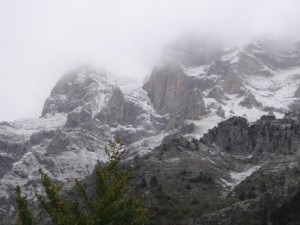
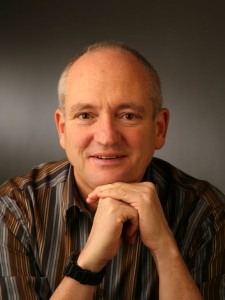
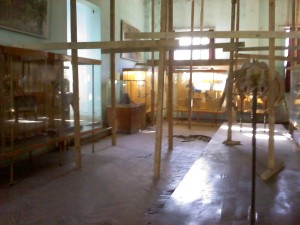




























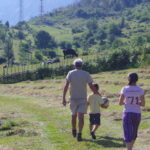 Valbona with Young Children?
Valbona with Young Children?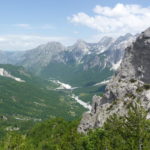 A Very Good Question! Where to Stay to Avoid the Hordes?
A Very Good Question! Where to Stay to Avoid the Hordes?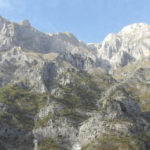 We visited in 2014 . . . .
We visited in 2014 . . . .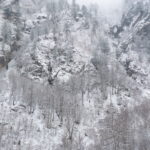
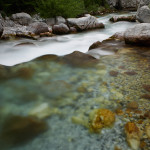 On the Dubious but nonetheless Glorious Triumph of Being [Recognized]
On the Dubious but nonetheless Glorious Triumph of Being [Recognized]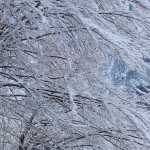 What Passion Feels Like
What Passion Feels Like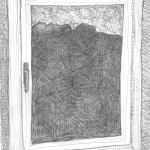 Long Dark Days
Long Dark Days